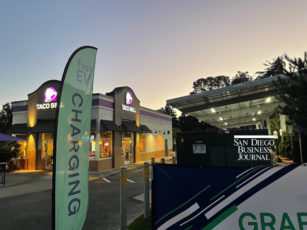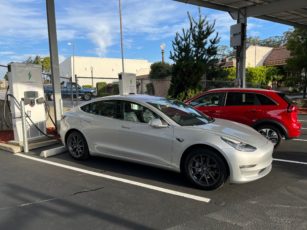ChargeNet Electrifies Its First Charging Station
EVs: Fast Food Co-Locations Aim to Solve EV Equity Issues
BY JEFF CLEMETSON
One of the biggest obstacles facing electric vehicle (EV) adoption is the inequitable access to charging. Currently, homeowners can set up their own charging systems and juice their EVs overnight, while people living in most apartments cannot.
San Diego-based ChargeNet Stations is looking to solve this issue by bringing fast-charge stations to fast food restaurants in lower-income neighborhoods.

CEO and Co-Founder
ChargeNet Stations
“The way we view this is, while you’re eating that value meal, you’re getting 200 miles or more in 10 minutes or less,” said ChargeNet Stations co-founder and CEO Tosh Dutt. “That’s what we’re trying to address here – people living their everyday lives and how charging fits into that.”
Quick Serve Solution
On Sept. 2, ChargeNet energized its first fast-charge system at a Taco Bell in South San Francisco. The company has five more in construction with its franchisee partner Golden Gate Bell, which operates 155 locations in the Bay Area. Dutt expects to eventually install charging systems at about 120 of those and agreements with other restaurant groups are in the works as well.
Quick serve restaurants (QSR) like Taco Bell are especially interested in installing EV charging stations, Dutt explained, because of their “ambitions ESG goals” they have set for themselves in reducing their historically large carbon footprint.
“We’re very eager to help them fulfill that and put their green where their mouth is, so to speak, and in turn also be able to democratize EV charging,” Dutt said. “Access is one of the biggest issues and if you look at where Americans go on a daily basis, over one third of the U.S. population eats at least one fast food meal a day.”
Dutt added that to meet the challenge of making EV ownership more equitable, charging stations need to “meet people where they’re at so that people can engage in the behavior they already do, like go to lunch, and not have to inconvenience themselves with trying to find a charger somewhere else.”
CGI Greenhouse
Dutt will be presenting ChargeNet’s solution for democratizing EVs by meeting people where they’re at by meeting other climate leaders where they’re at during this year’s Clinton Global Initiative (CGI) meeting in New York Sept. 19-20.
ChargeNet was chosen to be one of 31 companies for the inaugural CGI Entrepreneurship Greenhouse, a new program designed to support mission-driven entrepreneurs whose strategic and intersectional approaches can make a real impact in communities around the world.
CGI Greenhouse will provide the entrepreneurs like Dutt a platform to create partnerships and scale their work to the next level by presenting their climate solutions and connecting with Fortune 500 companies, large private and corporate foundations, family offices, investors and funders who are ready to implement their products and services.

Senior Fellow
Clinton Global Initiative
“Throughout the pandemic, entrepreneurs have shown tenacity, collaboration, and developed breakthrough innovations, which has rightly refocused CGI on the importance of supporting entrepreneurs as they create thriving communities,” said CGI Senior Fellow for Inclusive Economic Recovery and Growth Nish Acharya. “This year’s entrepreneurs were selected because of their strategic and intersectional approaches to innovation, and Greenhouse was created to connect new voices, new perspectives, and new approaches with global leaders ready to take action and change the status quo.”
Charge Station Developer
ChargeNet’s business model is a new approach to developing charging stations. Rather than using capital investments from site hosts, the company uses investments from infrastructure and climate investors, Dutt said.
ChargeNet is also unique in that it both integrates and optimizes the fast chargers, as well as storage batteries and solar carports. The company is also “hardware agnostic” and can use open-source technology.
“We’re able to integrate with multiple chargers, multiple battery storage systems and multiple solar systems,” Dutt said. “That flexibility allows us to extend the supply chain into other regions and also be able to scale.”
For the Taco Bell stations, ChargeNet is using Tritium EV chargers.
“They built a factory in Tennessee that just opened last week and I was there at the opening,” Dutt said. “Our chargers were one of the first ones off the line, so we got the first American-made chargers in the U.S., which is nice.”
Growth From Regulatory Action
What is also nice for ChargeNet and the EV industry, Dutt said, are recent regulations promoting electrification and decarbonization.
“The Inflation Reduction Act is absolutely critical to allow business and the investment world to invest in these technologies that are going to displace these greenhouse gasses that we’re emitting and do our best to offset them,” he said. “I’d say if this policy didn’t pass there’d be very little chance of being able to stop the earth’s temperature from rising more than 2 degrees.”
The Inflation Reduction Act as well as California’s recent pledge to ban the sale of combustion engine automobiles by 2035 is expected to ultimately reduce the cost of EVs and increase the number of drivers – many of whom will not have access to charging at home.
“When we start to look at middle income, lower middle income and people in low-income communities that are now going to have the ability to operate and adopt the EV because manufacturers are putting out a $30,000 EV, the principal problem they’re going to have is, where do we charge?” Dutt said.
ChargeNet Stations
Founded: 2020
CEO: Tosh Dutt
Business: Developer of EV charging stations for quick serve restaurants
Headquarters: San Diego, La Jolla
Employees: 35
Website: chargenetstations.com
Notable: ChargeNet is one of 31 companies in the inaugural Clinton Global Initiative Entrepreneurship Greenhouse program.


